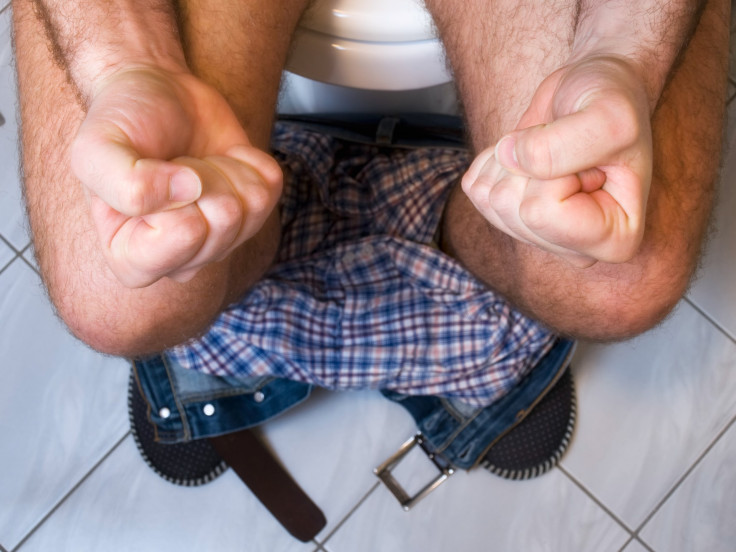Constipation Pain, For Starters: What Would Happen If You Didn't Poop For Weeks?

What would happen if you didn’t poop for weeks? Sounds like the beginning of a lame joke told in a comedy club, but it’s not. In fact, it’s a terrible ordeal, often made worse by bloating, cramps, and back pain. More importantly, not having a bowel movement for many days is a medical condition that needs to be attended to, so if three weeks expire and you still haven't pooped, you should be on your way to your healthcare provider. Now.
Once constipation (no bowel movement) has gone on for some time, the result can be what is known as an impacted bowel (sometimes called fecal impaction). Essentially, this means that a large lump of dry, hard stool is stuck inside your rectum. The reason this is so serious is your body is holding onto all the poisons and toxins that normally would be eliminated and flushed away with your feces. In short, an impacted bowel means pollution is building up inside your body.
Certainly this is troubling, but it can be fixed. Your healthcare provider most likely will begin by treating you to an enema. Unfortunately, an enema alone may not be enough to remove a large, hardened stool, so the problem may require manual removal. Not pretty, but this works for most people. In the rarest of cases, surgical removal may be necessary.
Once the immediate problem is resolved, the trick will be to prevent long-term constipation from ever happening again. To understand how to do this, it might be helpful to know a little bit more about poop and bowel movements.
All Things Bowel
A bowel movement is simply your body discarding waste through its efficient sanitation system. What happens is this: your digestive tract compacts the remainders of unabsorbed food into a mass (referred to as stool or feces), and then the colon passes this stool through the rectum and anus. The hollow organs of your digestive tract contain a layer of muscle within their walls and this muscle creates the movement that propels stool down and out. Without conscious effort, your body’s digestive tract muscles contract and relax as food journeys to its rightful end (the toilet).
Now, the timing of these movements is as individual as we are. Different patterns and routines all qualify as healthy and normal. Some people, for instance, have only three bowel movements per week, while others have three every day. Either pattern may be healthy, depending on the person. Sometimes frequency of bowel movements change, but if the stool looks the same and there’s no pain, this is most likely not a sign of illness. However, if you begin to experience pain, see blood, or repeatedly pass narrow, ribbon-like stools or loose, watery stools, it’s no laughing matter: time to see a doctor.
Constipation, whether short or long term, is usually a sign that something is wrong. It may be simply a problem with your choice of foods, but it could be a more complex health issue. On again off again constipation could mean colon cancer, for instance. Certainly, you should go to a doctor if you are not passing stool as often or as easily as you normally do as the result could be impacted feces if this goes on for weeks. Even when it's only mild constipation, if it keeps recurring, you would want to see a doctor. Something serious could be happening inside your body or you might be headed toward an impacted bowel.
Who’s at risk?
Often, impaction occurs in people who have been using laxatives for chronic constipation. In some cases, people stop taking the laxatives, and discover their muscles have "forgotten" how to move feces on their own. This happens quite a bit.
People who sit too much or don’t exercise enough are prone to mild constipation, but in most cases this does not turn into impaction.
Frequently, those who are bed-ridden suffer constipation and if it turns into a long-term condition, this might lead to impaction.
Certain drugs are likely to cause constipation. Narcotic pain medicine, such as methadone and codeine, are common culprits, as are anticholinergics, which treat Chronic Obstructive Pulmonary Disease.
Finally, people who have damaged nerves connected to the muscles of the intestines might develop chronic constipation.
Foods That Help
Sometimes clogged pipes are the simple result of a diet gone wrong. In such cases, eating plenty of fiber and roughage should help. You've probably heard these terms often, but what's the difference?
During digestion, fiber binds with water and by remaining moist, it moves through your system more easily. Roughage, on the other hand, remains mostly intact during digestion, but by doing so, it helps push things along by more or less scraping against the sides of the colon and preventing anything from becoming trapped there. Roughage comes from vegetables such as corn, whole grains such as barley, and wheat bran. Apples, pears, berries, and citrus fruits also are high in roughage. Fiber is found in beans, peas, lentils, seeds, nuts, and some types of fruits and veggies, including carrots, cucumbers and zucchini.
For many people, eating right is the key to avoiding constipation and so, too, the possibility of an impacted bowel. When in doubt, choose fiber and roughage!



























